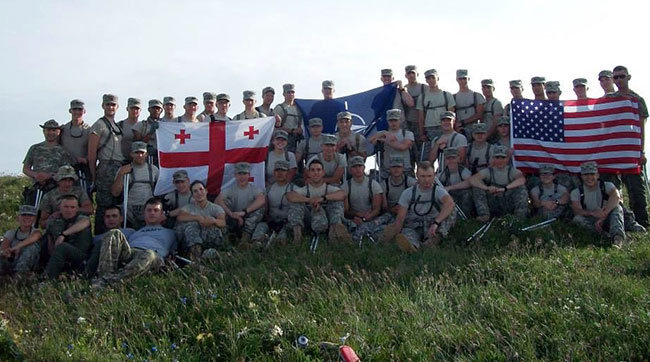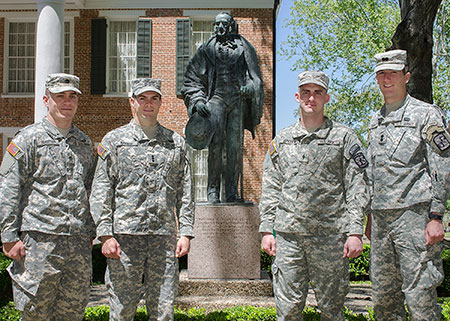Cadets Embark On Mission Of Diplomacy Through CULP Program
April 22, 2014
SHSU Media Contact: Marissa Nunez
 |
| Colton Barber was one of more than 40 cadets from across the country who spent a month in Georgia as part of the U.S. Army Cadet Command's Cultural Understanding and Language Proficiency Program. The cadets participated in a two-day training hike into the Georgian mountains and stopped to take a picture at the peak. Georgian cadre (instructors) flank the cadets above. —Submitted photo |
In today’s geo-political world, countries interact with each other on a day-to-day basis in business, communications and trading.
The U.S. Army is no different.
Soldiers who are deployed overseas engage in more than just warfare, rebuilding infrastructure, providing training and interacting with locals in their day-to-day duties.
For the past three years, SHSU’s ROTC Bearkat Battalion has sent five cadets overseas to work with foreign militaries through the U.S. Army Cadet Command’s Cultural Understanding and Language Proficiency Program.
The program prepares cadets for that “other” side of their careers as army officers by immersing them in various cultures and languages so that they can learn through personal experience, according to Maj. Jonathan Platt, assistant professor and assistant chair of military science at SHSU.
“This program helps create better military leaders because cadets are more educated and are able to successfully operate in a foreign theater,” he said.
Senior criminal justice majors David Spicer, Colton Barber and Jacob Burney and junior management major Samuel Houston traveled through the CULP program to countries all over the world last summer, training with and teaching English to foreign militaries.
Cadets from all over the country apply for the CULP program and are chosen based on GPA scores, physical fitness, personal essays and other factors to ensure the best are sent out to represent their university and the U.S. Army in the best light, according to Platt. Before deploying to their chosen destinations for a month, CULP cadets first attend a five-day soldier readiness process at Fort Knox, Ky.
For many, the program offers long-term implications for their future careers as army officers.
 |
| Samuel Houston, Colton Barber, David Spicer, and Jacob Burney travelled to Vietnam, Georgia, Thailand and Spain for the Cultural Understanding and Language Proficiency Program. —Photo by Brian Blalock |
“Since we’re pulling out of Iraq and Afghanistan, and we won’t be in a conflict, a lot of military operations from now on could tie in to working with other militaries for training exercises,” Barber said. “(Through CULP) We were working with countries that America has a huge influence on.
“Part of our future as military officers, since we’re not necessarily at war, will be spent working with these armies.”
Spicer, who will graduate in May and earn his commission as an air defense artillery branch officer, traveled to Thailand to teach English to future lieutenants at the country’s top military academy, Chulachomklao Royal Military Academy.
“This trip was all about building relations with Thailand because they are always at conflict with Myanmar,” Spicer said. “So we want to always have some sort of presence in that region, just in case.”
Stationed 80 miles outside of Bangkok, the CRMA is mandatory for all Thai cadets.
“Most cadets begin training in high school, then go to a military high school, and then to the CRMA, where they learn infantry tactics, how to use various fire-arms, drive different types of vehicles, and participate in airborne school,” Spicer said.
Before graduating from the academy, each Thai cadet must pass the grueling five-phase ranger school, as well as climb a mountain and mount their graduate flag at the top.
“It’s like a right of passage for Thai cadets before graduating,” said Spicer, who participated in the mountain climb.
He admits that he wasn’t excited when he first found out that he would be going to Thailand.
“I knew nothing about Thailand and I thought it wasn’t very interesting, but once I got there everything changed,” Spicer said. “There were beautiful mountains everywhere and the people I met were so kind and friendly; they treated us like we were one of them.
“This trip helped me with my career in the army by allowing me to learn about another culture,” Spicer said. “I now have friends who will be the future leaders of the Thai military, so this will allow me to interact with their nation’s military later down the road.”
Houston traveled to Hanoi, Vietnam, to teach English to Vietnamese Army officers, which gave him experience in working with language and cultural barriers.
“At times, language and cultural barriers can cause issues with accomplishing tasks, but the trip gave me skills to successfully complete assigned tasks in other countries,” Houston said. “It helps build relations and rapport between our military and theirs.
“As an officer in the army, you’re a professional, but you’re also a diplomat, in your own way,” he said.
Burney, who will commission as an aviation officer and graduate in May, traveled to Madrid, Spain, where he trained with the Brigada Paracaidista, or Paratrooper Brigade, teaching conversational English and exchanging military tactics.
While working with the BRIPAC, he was able to complete Spanish airborne training and made a jump with the unit out of a helicopter.
“Jumping out of a helicopter is totally different than jumping out of a plane because on a plane you jump out of a side door, but when you jump out of a helicopter you pretty much just walk off a ramp,” said Burney. “It’s a lot smoother than jumping out of a plane.”
Burney also served as a public relations liaison during his time in Spain, documenting their activities.
In their off hours, Burney and cadets from other universities traveled around the country to get a better understanding of the culture.
He recalls how their Spanish counterparts would take them all over the cities, showing them the main tourist sites and telling them, “this is something you have to do while you’re here.”
On one trip, Burney and his fellow cadets traveled to Seville, Spain, where flamenco dancing originated.
The social aspect of the program is a valuable form of professional networking, he said.
“(After graduation) I am going to Fort Rucker, Ala., for Army Aviation School,” Burney said. “I would like to be stationed in Europe, so CULP helped build relationships with the Spanish NCOs (non-commissioned officers) and commissioned officers so that we can have better relations and work with them in the future.”
Barber, who went outside of the United States for the first time, was able to gain knowledge and experience in his branch detail, infantry, during his time in CULP.
Building foreign relations... |
In the eastern European country of Georgia, located at the crossroads of Western Asia and Eastern Europe, Barber traveled to a small mountainside village where he participated in strenuous mountain training and survival school.
“Infantry officers (in the U.S.) go to ranger school and there’s a mountain phase to that,” Barber said.
“When I was in Georgia, we were doing a mountain warfare school, so the mountain training, the knots, the rappelling techniques, all of the stuff I learned there, it’s all tied right in to what I’m going to have to do as an officer,” said Barber, who graduates and receives his commission in May. “We learned how to rock climb, prepare food and survive in the mountains, as well as learning military tactics and operations pertaining specifically to high altitude environments.”
Barber’s days consisted of hikes and various obstacle passes throughout the mountainside.
“Growing up, they (Georgians) have rock climbing walls in their high schools, because it’s a sport, like swimming is here,” Barber said. “They have it down to an art form.”
At the end of the training, Barber was named "Distinguished Honor Graduate" and was presented with a token of the Georgian national emblem, the lion.
All four cadets said they gained so much more than they thought they would. Each recalled friendships and lessons they learned from the experience and how they want to use the knowledge they gained in their future careers with the Army.
Burney believes the trip teaches cadets not only how to interact with other countries, but how to build lasting relationships with them.
“Through this, we got to see a lot of things we would never have been able to. It was definitely a different experience,” Burney said.
For Spicer the trip allowed for him to see and appreciate things most people in first-world countries forget to appreciate.
“Since Thailand is still a developing nation, it is really hard for them to acquire something that we take for granted over here, like fresh water,” he said. “It was definitely a very humbling experience.”
Barber also got to see the difference between the U.S Army and that of a developing nation like Georgia.
“Those guys over there are doing the exact same thing we are for little-to-no pay,” he said. “Going into the army isn’t just a career path for them; they do it because they really want to be there. It definitely made me appreciate things we have over here and proud to be a part of the U.S. Army.”
This summer six Bearkats will have their own CULP experiences. Seniors Rosa Cornejo, Rafael Galiano, and Stephan Nalley, junior Joanna Lorensen, and sophomores Tyler Livezey and Joe Salinas will travel to the Dominican Republic, Guatemala, France, and Lithuania.
“My CULP mission to Romania is going to give me a taste of what it’s like to work in the military and with another country and culture,” Lorensen said. “It will enable me in the future to work better and more professionally with people outside of the U.S.”
- END -
This page maintained by SHSU's Communications Office
Associate Director: Julia May
Manager: Jennifer Gauntt
Located in the 115 Administration Building
Telephone: 936.294.1836; Fax: 936.294.1834
Please send comments, corrections, news tips to Today@Sam.edu.

 SamWeb
SamWeb My Sam
My Sam E-mail
E-mail

